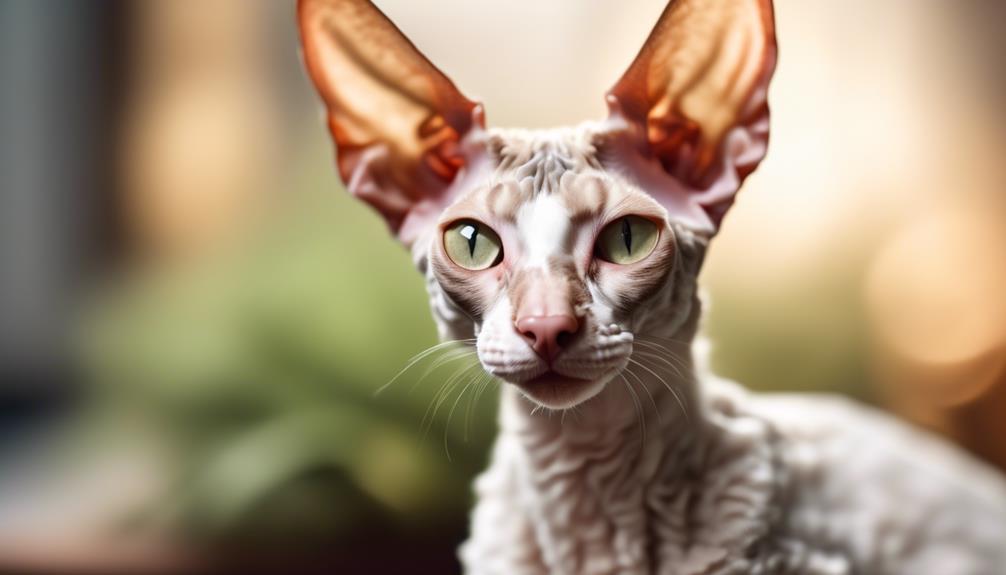
With their enchanting curly coats and graceful presence, the Cornish Rex cat breed is like a work of art coming to life.
Originating in England, these medium-sized felines exude elegance and charm.
But there’s more to the Cornish Rex than just their stunning appearance.
Their playful and affectionate nature, combined with their intelligence, makes them ideal companions for both individuals and families.
But what sets this breed apart from others? What are their unique characteristics and traits?
To uncover the answers and dive deeper into the world of the Cornish Rex, one must journey into their captivating world and discover the secrets that lie within.
Key Takeaways
- The Cornish Rex is a medium-sized cat breed with a short, wavy, and soft coat in various colors and patterns.
- They are known for being playful, affectionate, and intelligent, making them trainable and enjoyable companions.
- While they have moderate exercise needs, their grooming requirements are low-maintenance, with just occasional brushing and dental hygiene.
- The Cornish Rex is generally healthy but may be prone to certain health conditions like hip dysplasia and hypertrophic cardiomyopathy (HCM).
Origin and Size
The Cornish Rex cat breed originated in England and is known for its medium size, typically weighing between 6 to 10 pounds.
This breed belongs to the natural breed group and lasts 12-15 years.
Cornish Rex cats have short, wavy, and soft coats, which come in a variety of colors and patterns.
While they aren’t completely hypoallergenic, their low-maintenance grooming needs make them a popular choice for many cat lovers.
In terms of temperament, Cornish Rex cats are playful, affectionate, and highly intelligent.
They require moderate exercise and are trainable.
Although generally healthy, they’re prone to certain health conditions such as hip dysplasia and hypertrophic cardiomyopathy (HCM).
See another cat breed profile.
Cymric Cat Breed
Breed Group and Lifespan
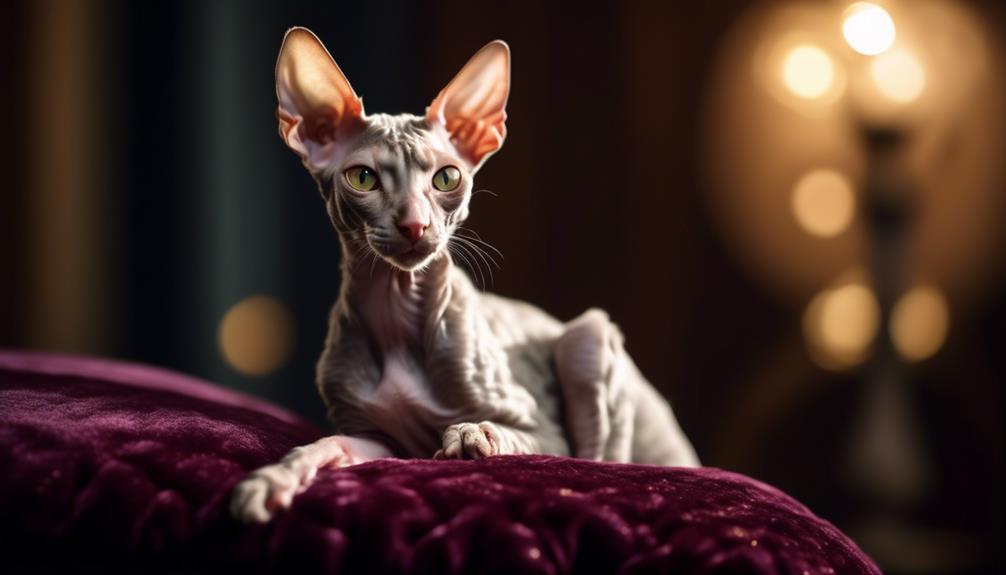
Originating in England, the Cornish Rex cat breed falls into the natural breed group and lasts 12-15 years.
As a natural breed, Cornish Rex cats aren’t the result of human intervention or selective breeding.
They’ve a unique genetic mutation that causes their short, wavy, and soft coat.
Despite their distinct appearance, Cornish Rex cats are generally healthy and have a moderate exercise requirement.
They’re known for their playful, affectionate, and intelligent nature.
With proper care and attention, Cornish Rex cats can live a long and fulfilling life of companionship, reaching an average lifespan of 12-15 years.
Potential owners need to be aware of this lifespan and be prepared for the commitment that comes with caring for a Cornish Rex cat.
Coat Characteristics
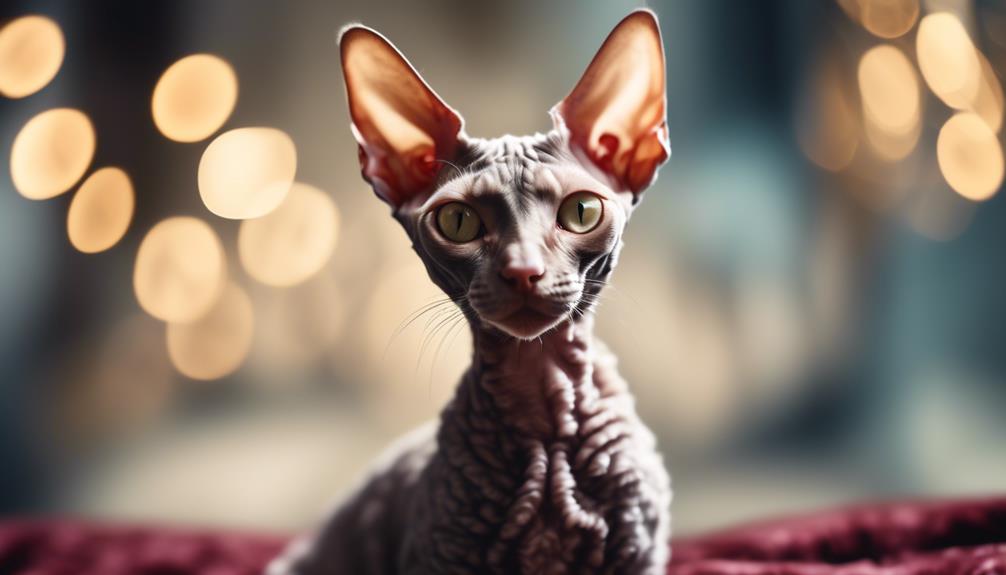
What are the distinguishing characteristics of the Cornish Rex cat’s coat?
The Cornish Rex cat has a short, wavy, soft coat that sets it apart from other breeds.
Here are some key features of the Cornish Rex’s coat:
- Texture: The coat is known for its unique texture caused by the absence of the outer guard hairs. This gives it a soft and velvety feel.
- Appearance: The wavy curls of the coat give the Cornish Rex an elegant and stylish look.
- Patterns and colors: The breed comes in a variety of colors and patterns, including solid, tabby, tortoiseshell, and bi-color. This wide range of options allows for individuality and uniqueness among each cat.
These distinctive coat characteristics contribute to the Cornish Rex’s charm and make it a visually stunning breed.
Temperament and Intelligence
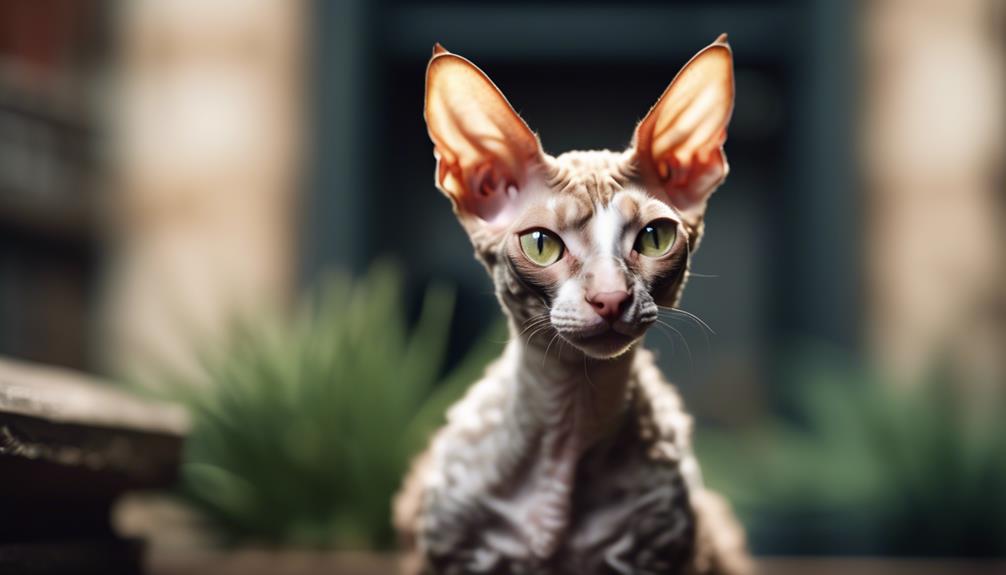
After exploring the unique coat characteristics of the Cornish Rex cat, it’s time to delve into their remarkable temperament and intelligence.
Cornish Rex cats are known for their playful and affectionate nature.
They have a high level of intelligence and are quick learners.
These cats love attention and enjoy performing tricks, often showing a sense of humor.
They’ve been observed opening doors and cabinets with ease.
Cornish Rex cats are social animals and enjoy the company of their human family members.
They follow people around and can be easily handled.
They also get along well with children and can be good companions for other pets.
With their constant need for companionship and love, Cornish Rex cats make wonderful and interactive pets.
Exercise Needs and Trainability
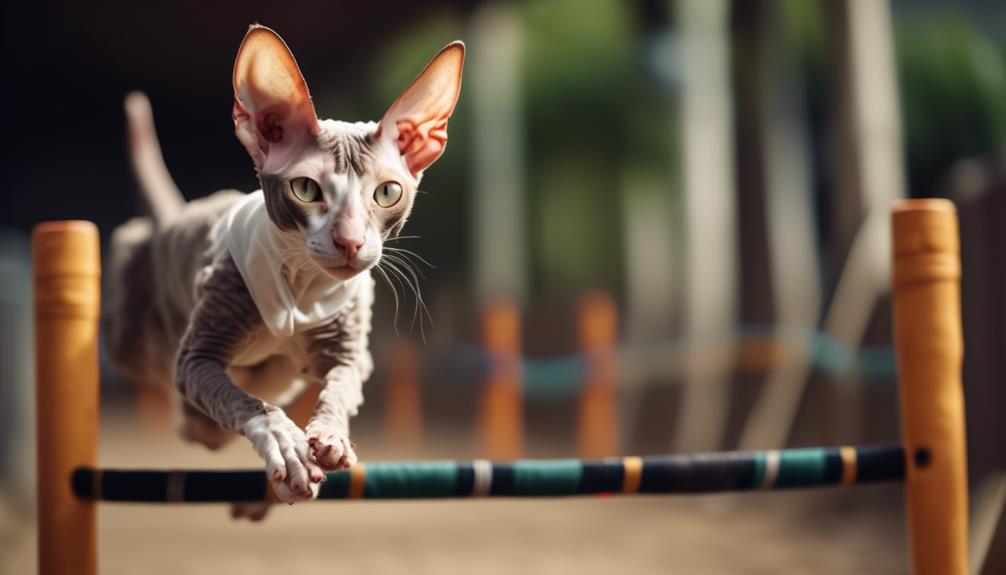
Cornish Rex cats have moderate exercise needs and are easily trainable.
They enjoy interactive play sessions with their owners and are always up for a game of fetch or chase.
To keep them mentally stimulated and physically active, here are a few exercise ideas for Cornish Rex cats:
- Interactive toys: Provide them with puzzle or treat-dispensing toys to keep their minds engaged while playing.
- Feather teasers: Use feather teasers or wand toys to stimulate their hunting instincts and provide a fun way to exercise.
- Clicker training: Cornish Rex cats are intelligent and respond well to positive reinforcement. Use clicker training to teach them tricks and commands.
Grooming Requirements
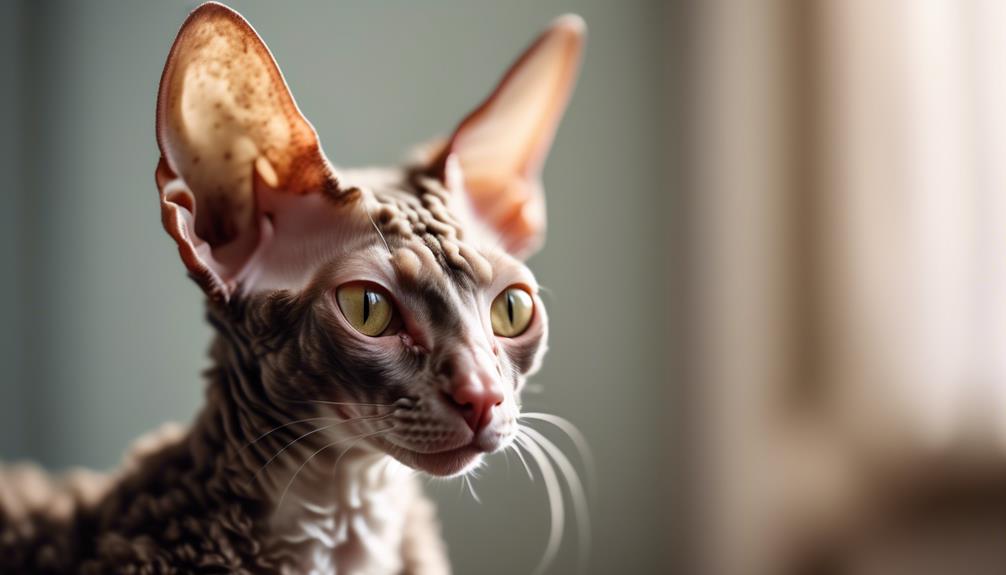
To properly care for a Cornish Rex cat, understanding their grooming requirements is essential.
The good news is that grooming a Cornish Rex is typically easy and low-maintenance.
Their short, wavy, and soft coat only requires occasional brushing with a hand to keep it looking neat.
Some cats may need a little extra help from a soft bristle brush or fine-tooth comb to remove loose hairs or tangles.
Baths are rarely necessary, except for white cats, who may need occasional bathing to keep their coat clean.
In addition to regular brushing, it is important to prioritize dental hygiene by providing routine dental care.
Weekly wiping of the corners of their eyes can also help prevent any build-up or discharge.
| Grooming Requirements | ||
|---|---|---|
| Coat | Short, wavy, soft | Occasional brushing |
| Baths | Rarely necessary | White cats may need bathing |
| Dental hygiene | Regular care | Prioritize dental health |
| Eye care | Weekly wiping | Prevent build-up or discharge |
Common Health Conditions
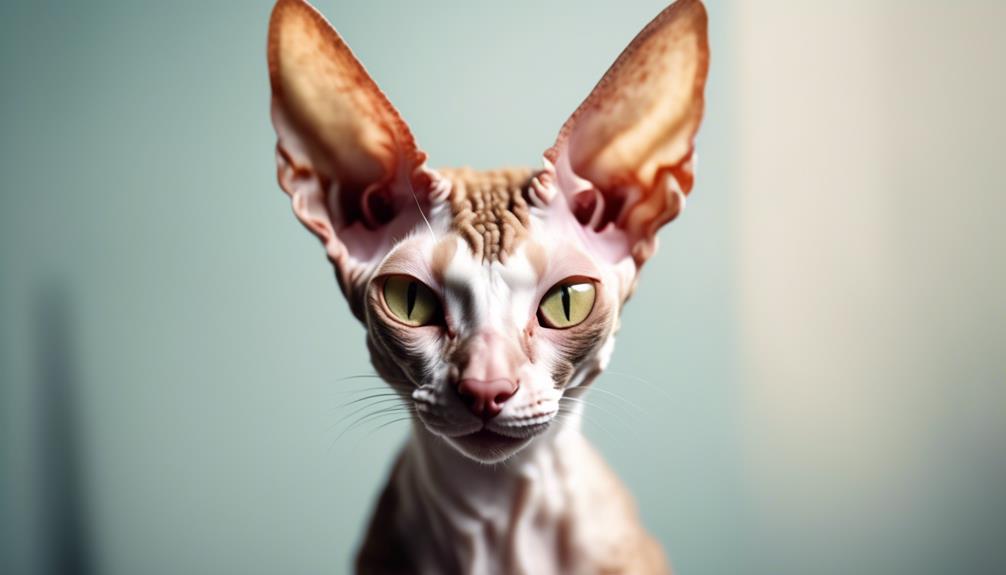
Common health conditions can affect Cornish Rex cats despite their generally healthy nature.
Owners need to be aware of these conditions and take necessary precautions.
Here are some common health conditions that can affect Cornish Rex cats:
Musculoskeletal Issues:
- Hip Dysplasia: This condition occurs when the hip joint doesn’t develop properly, leading to pain and mobility issues.
- Patellar Luxation: This condition causes the kneecap to dislocate, leading to lameness and discomfort.
Heart Conditions:
- Hypertrophic Cardiomyopathy (HCM): Cornish Rex cats are predisposed to this heart disease, which causes the heart muscles to thicken, leading to heart failure.
History and Origins
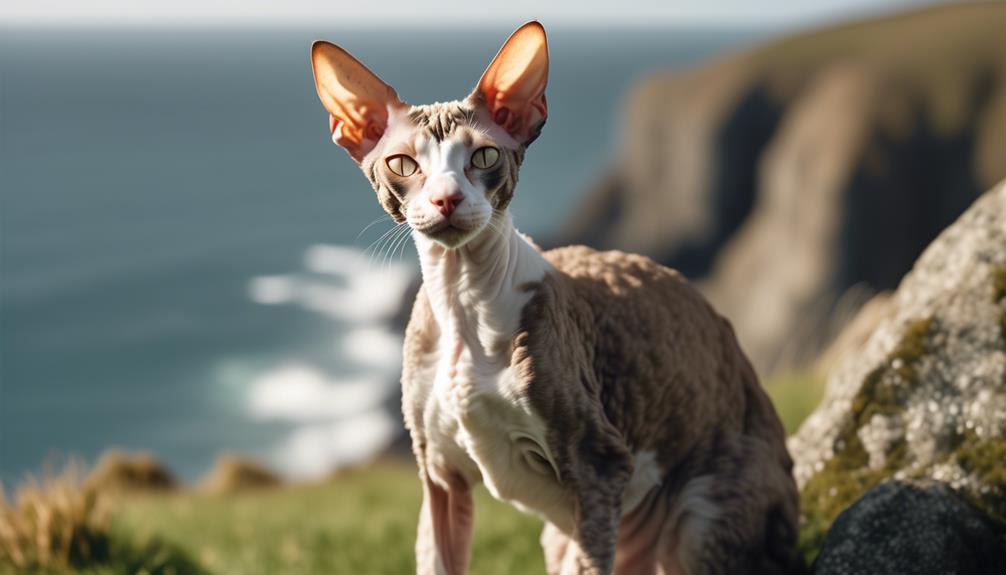
The birthplace of the Cornish Rex breed can be traced back to Cornwall in England.
This unique breed originated from a spontaneous natural mutation that occurred in 1950.
A curly-coated kitten named Kallibunker was born to a shorthaired tortoiseshell and white cat named Serena.
It’s suspected that Ginger, Serena’s litter brother, was the father of the litter.
This particular mutation resulted in the breed’s distinctive short, wavy, and soft coat.
Since then, the Cornish Rex has gained popularity for its playful, affectionate, and intelligent nature.
Today, their cherished companions are adored for their sophisticated appearance and ability to perform tricks.
Choosing a Cornish Rex
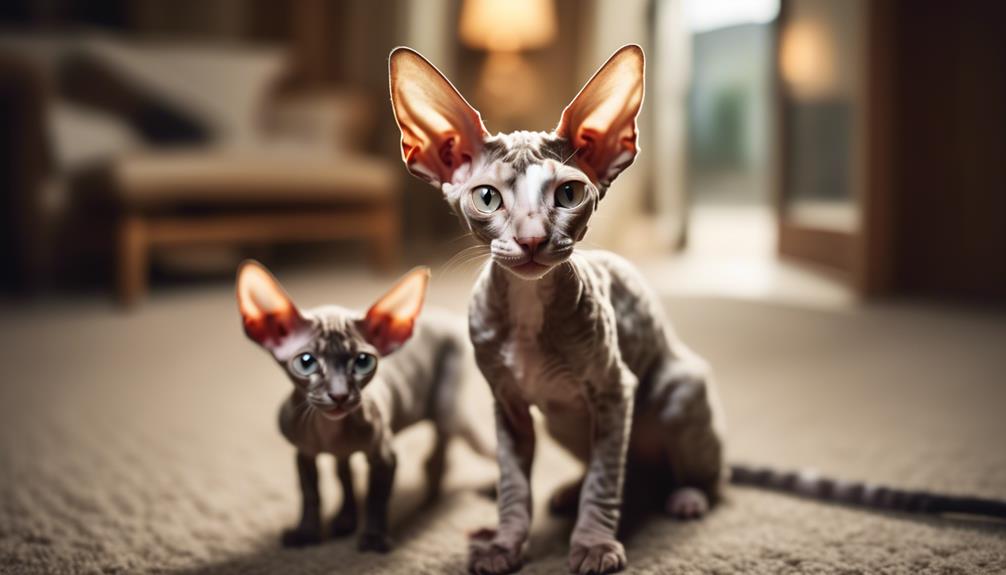
After learning about the history and origins of the Cornish Rex breed, potential owners can now make an informed decision when choosing a Cornish Rex cat.
When it comes to choosing a Cornish Rex, there are a few important considerations to keep in mind:
- Adoption: Prioritize adopting from rescue organizations or shelters. This not only gives a loving home to a cat in need but also helps reduce the number of cats in shelters.
- Reputable breeders: If purchasing a kitten, choose a reputable breeder. Conduct thorough research on the breeder’s practices. Reputable breeders prioritize health and temperament and should conduct necessary health screenings and provide a nurturing environment.
Care and Maintenance
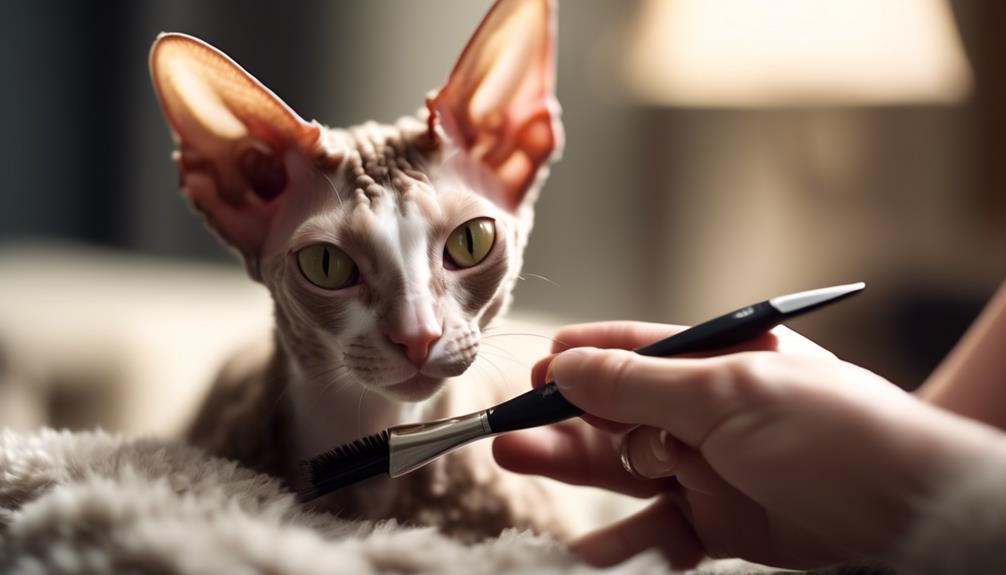
To properly care for a Cornish Rex cat, owners must be attentive to their unique grooming needs and overall well-being.
Grooming for a Cornish Rex is typically easy, as their short, wavy, and soft coat only requires brushing with the hand.
However, some cats may benefit from a soft bristle brush or fine-tooth comb.
Baths are rarely necessary, except for white cats. Regular dental hygiene is important for maintaining oral health.
Additionally, owners should wipe the corners of their eyes every week.
Regarding overall well-being, Cornish Rex cats are generally healthy but can be prone to certain health conditions, such as hip dysplasia and hypertrophic cardiomyopathy (HCM).
Therefore, regular veterinary check-ups and a balanced diet are essential for their care and maintenance.
Personality and Compatibility
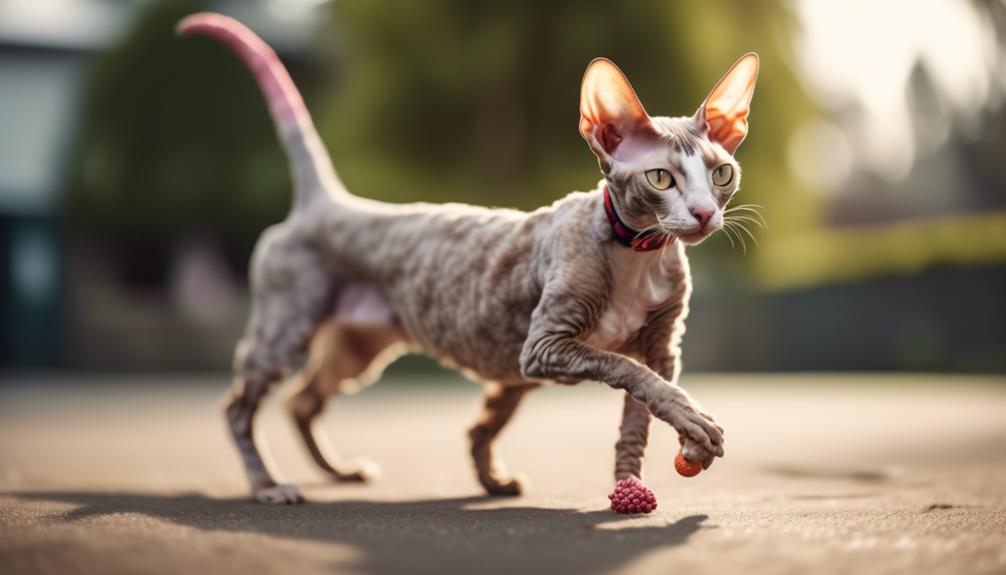
Personality and compatibility vary among individual Cornish Rex cats, but they’re generally known for being highly intelligent, affectionate, and playful.
Here are some key aspects of their personality and compatibility:
Personality traits:
- Highly intelligent: Cornish Rex cats are quick learners and enjoy mental stimulation.
- Affectionate: They love attention and will often follow their owners around the house.
- Playful: These cats are active and enjoy interactive toys and games.
Compatibility:
- Good with children: Cornish Rex cats are generally patient and tolerant, making them suitable companions for kids.
- Social with other pets: They can get along well with other cats and dogs as long as proper introductions are made.
Frequently Asked Questions
Are Cornish Rex Cats Hypoallergenic?
Cornish Rex cats are not completely hypoallergenic.
While their short, wavy, and soft coats may produce fewer allergens, individuals with allergies should spend time with a Cornish Rex cat to see if they react.
How Often Should I Groom a Cornish Rex Cat?
A Cornish Rex cat should be groomed regularly to maintain their short, wavy coat.
This can be done by brushing the hand over the coat or using a soft bristle brush or fine-tooth comb if needed.
Can Cornish Rex Cats Be Trained to Do Tricks?
Yes, Cornish Rex cats can be trained to do tricks. They are highly intelligent and love attention.
They can learn to perform various tricks and behaviors with patience and positive reinforcement.
What Are the Common Health Conditions That Cornish Rex Cats Are Prone To?
Cornish Rex cats are prone to certain health conditions, such as hip dysplasia and hypertrophic cardiomyopathy (HCM).
These conditions can affect their health and well-being, so regular vet check-ups are important.
Are Cornish Rex Cats Good With Other Pets?
Cornish Rex cats are good with other pets. They enjoy playing and interacting with others, making them a good companion for other animals.
Their active and social nature allows them to get along well with both children and other pets.
Conclusion
In conclusion, the Cornish Rex is a fascinating cat breed with its unique curly coat and elegant appearance.
Their playful and affectionate nature makes them wonderful companions for individuals and families.
The Cornish Rex is low-maintenance in grooming and generally healthy, although they may be prone to certain health conditions.
When choosing a Cornish Rex, it’s important to prioritize adoption from rescue organizations or reputable breeders.
The Cornish Rex’s active and social nature makes them a great addition to any household.




